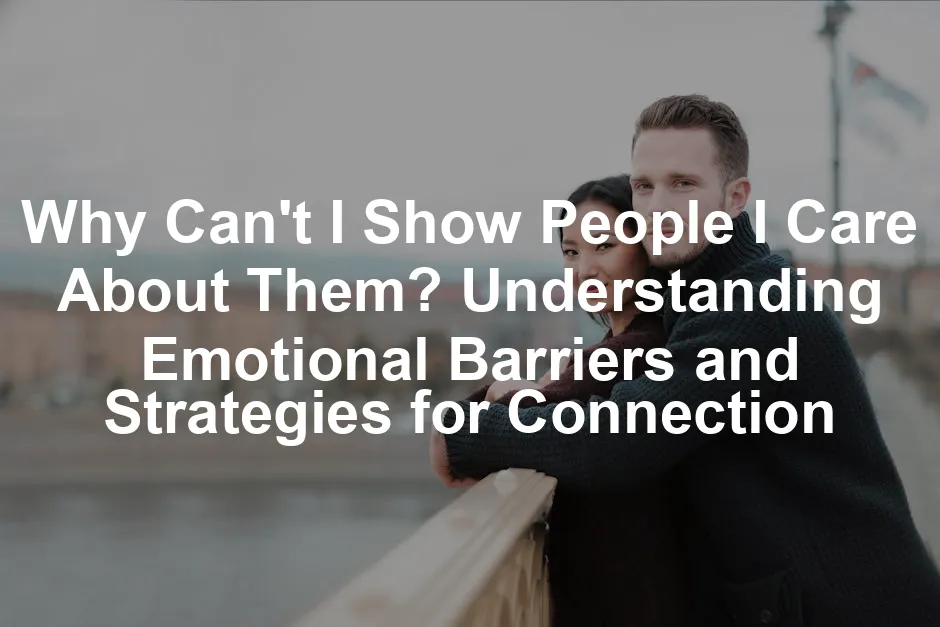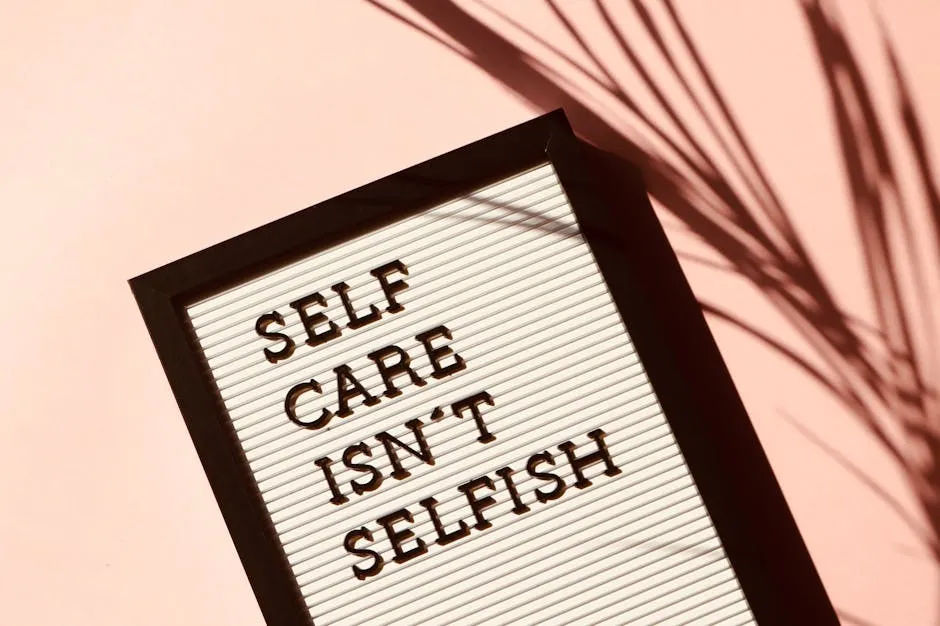
Why Can’t I Show People I Care About Them? Understanding Emotional Barriers and Strategies for Connection
Introduction
Many people face emotional barriers that hinder their ability to express care. This challenge can impact relationships and mental health significantly. Emotional expression is vital for building strong connections and enhancing overall well-being. So, why do some individuals struggle to show they care?
Summary and Overview
In this article, we’ll explore the emotional barriers that prevent people from expressing their feelings. Understanding these barriers is crucial for personal growth and healthier relationships. We’ll also discuss empathy, which varies greatly among individuals. Recognizing these differences can shed light on how emotional barriers influence our connections. By grasping these concepts, we can better understand our behavior and its effects on mental well-being.

To enhance your journey towards emotional understanding, consider keeping a Journaling Notebook. Journaling helps you reflect on your thoughts and can be a powerful tool for self-discovery.
Understanding Emotional Barriers
Definition of Emotional Barriers
Emotional barriers are obstacles that make it difficult for individuals to express their feelings. These barriers often stem from past experiences, fears, and societal expectations. They can manifest in many ways, such as avoidance of deep conversations or difficulty initiating connections.
Common emotional barriers include:
- Fear of Vulnerability: Many individuals fear being open with their feelings. This fear often leads to emotional withdrawal.
- Past Trauma: Experiences from the past can shape how people express care. Trauma can create a protective shield, making emotional expression feel risky.
- Low Self-Esteem: Individuals with low self-esteem might believe they don’t deserve to show care or receive it in return.
- Cultural Norms: Societal and cultural expectations can dictate how emotions are expressed. In some cultures, showing vulnerability is discouraged, leading to emotional distance.

Recognizing these barriers is the first step toward overcoming them. Understanding how they affect our interactions can empower us to create deeper connections. For more insights on this topic, see how understanding emotional responses is crucial for mental health.
Understanding emotional barriers is essential for improving mental health and fostering connections. why understanding emotional responses is crucial for mental health
The Role of Empathy
Understanding Empathy
Empathy is the ability to understand and share the feelings of others. It plays a vital role in our interactions. When we empathize, we connect on a deeper level. This connection fosters trust and strengthens relationships. However, empathy can differ from one person to another. Some may find it easy, while others struggle to feel connected. This variation can stem from personal experiences or emotional barriers.

To improve your empathetic skills, consider using an Empathy Card Game. It’s a fun way to engage with friends and family while building deeper connections!
Circles of Empathy
The concept of ‘circles of empathy’ helps explain why we care for some more than others. At the center, we have ourselves, followed by family and close friends. As we move outward, empathy often diminishes for acquaintances and strangers. This isn’t a flaw; it’s a natural human tendency.
The identifiable victim effect illustrates this well. When we hear about a single person in distress, we feel more compelled to help than when faced with large, abstract numbers. A single story resonates more than a statistic. Recognizing these circles can help us understand our emotional investments. It allows us to focus our efforts where they matter most. By nurturing those closest to us, we can create meaningful connections that enrich our lives.

Strategies for Overcoming Emotional Barriers
Building Self-Awareness
Have you ever wondered why you struggle to express care? The first step is understanding your emotional barriers. Take some time to reflect on your feelings and experiences. Journaling can be a powerful tool for this. Write down your thoughts and emotions to reveal patterns. Alternatively, consider talking to a counselor. They can guide you through your feelings and help you discover underlying issues. Self-awareness opens the door to change. It’s about recognizing what holds you back.

For a structured approach, grab a Adult Emotional Intelligence Workbook. It’s designed to help you develop self-awareness and emotional skills.
Practicing Vulnerability
Vulnerability plays a vital role in relationships. It’s how we connect on a deeper level. But being open can feel scary. Start small. Share a personal story with a trusted friend. This can help you practice being open. Ask others about their experiences too. It creates a safe space for both of you. Remember, vulnerability fosters trust. It shows that you care enough to let others in.

Small Acts of Kindness
Sometimes, words can be hard to find. That’s where small acts of kindness come in. Think about simple gestures like a smile or a compliment. These non-verbal cues can show you care without saying a word. Active listening is another powerful way to express concern. When someone talks, give them your full attention. Ask follow-up questions to show you’re engaged. These small acts can lead to deeper connections over time.

Seeking Professional Help
If you find these barriers overwhelming, consider seeking professional help. Therapy can provide a safe space to explore your feelings. A therapist can offer insights and strategies to help you express care more freely. They can guide you through fears and past traumas that hinder emotional expression. Remember, seeking help is a sign of strength, not weakness. It’s a step toward healthier relationships and emotional well-being.
In addition, exploring resources like a Self-Help Book: “The Gifts of Imperfection” by Brené Brown can provide valuable insights and motivate you to embrace vulnerability.

Seeking professional help can be transformative for managing emotional barriers. why is seeking professional help crucial for managing bruxism in the coming months
The Impact of Not Showing Care
Effects on Relationships
Not expressing care can significantly strain relationships. When we hold back our feelings, loved ones may feel neglected or unimportant. This emotional distance creates misunderstandings and resentment. Over time, the lack of communication can lead to a breakdown of trust.

Feeling disconnected from those we care about can also result in loneliness. Without the comfort of emotional support, isolation can set in. You might find yourself withdrawing further, creating a vicious cycle. Relationships thrive on open communication, and failing to express care can hinder connection.
If you’re looking for a way to enhance your emotional support, consider an Emotional Support Plush Toy. Sometimes, a little comfort can go a long way in managing feelings of loneliness.
Mental Health Consequences
The link between emotional expression and mental health is profound. Studies show that people who regularly express their feelings tend to experience lower anxiety and depression levels. A study from the American Psychological Association found that sharing emotions can improve overall mental well-being.

Conversely, repressing emotions can lead to heightened stress and emotional turmoil. When you don’t show care, it can negatively affect your self-esteem and sense of belonging. The more you hold back, the more difficult it becomes to reach out. Recognizing this cycle is crucial for breaking free from emotional barriers.
Conclusion
In summary, not showing care impacts both relationships and mental health. The emotional distance created can lead to loneliness and strained connections. Remember, overcoming these barriers takes time and effort. Start small by expressing care in little ways. Each step can help you build stronger connections and improve your emotional well-being. Take the first step today!
FAQs
Why do I find it hard to express my feelings?
Many factors contribute to difficulty in expressing feelings. Psychological reasons often include fear of vulnerability or past trauma that creates barriers. If you’ve faced rejection or emotional pain before, it’s natural to guard your heart. Social influences also play a role. Cultural norms may discourage showing emotions, especially in certain families or communities. This can lead to a belief that expressing care is weak or unnecessary. It’s essential to recognize these influences to understand your challenges better.
Can therapy help me show more care for others?
Absolutely! Therapy can be a powerful tool in addressing emotional barriers. A trained therapist can help you identify the root causes of your emotional struggles. They provide a safe space for you to explore your feelings without judgment. Through therapy, you can learn techniques to express care more easily. This support can also improve your self-esteem, making emotional expression feel more natural and less intimidating.
What are some simple ways to show I care without words?
You can express care through various non-verbal actions. A warm smile can brighten someone’s day. A gentle touch on the shoulder can convey support. Acts of kindness, like making a cup of tea for a friend, show you care. Listening actively when someone shares their feelings also speaks volumes. These small gestures can create a sense of connection, even when words feel hard to find.
How does self-esteem affect my ability to show care?
Self-esteem plays a crucial role in emotional expression. If you struggle with low self-esteem, you might feel unworthy of love or connection. This belief can hinder your ability to express care for others. When you value yourself, you’re more likely to reach out and connect. Building self-esteem can lead to a greater willingness to show care. It helps you believe that your emotions matter and that it’s okay to express them.
Is it normal to struggle with showing care?
Yes, many people face challenges when it comes to showing care. You are not alone in this experience. Emotional barriers are common and can stem from various sources, including upbringing and personal experiences. Recognizing that this struggle is widespread can be comforting. It’s part of being human. Acknowledging this can encourage you to take steps toward improving your emotional expression.
What steps can I take to improve my emotional expression?
Improving emotional expression starts with self-awareness. Reflect on your feelings and the reasons behind them. Consider practicing vulnerability by sharing small thoughts or feelings with trusted friends. Engaging in small acts of kindness can also help you express care naturally. Finally, seeking professional help can provide valuable insights and strategies to enhance your emotional expression.
How can I help someone else who struggles to show they care?
Supporting someone who struggles with emotional expression requires patience and understanding. Start by encouraging open conversations about feelings. Let them know it’s okay to express themselves without judgment. Share your own experiences to normalize their feelings. Simple gestures, like sending a supportive text or checking in regularly, can also make a difference. Being a consistent source of support can help them feel more comfortable over time.
Please let us know what you think about our content by leaving a comment down below!
Thank you for reading till here 🙂
All images from Pexels




